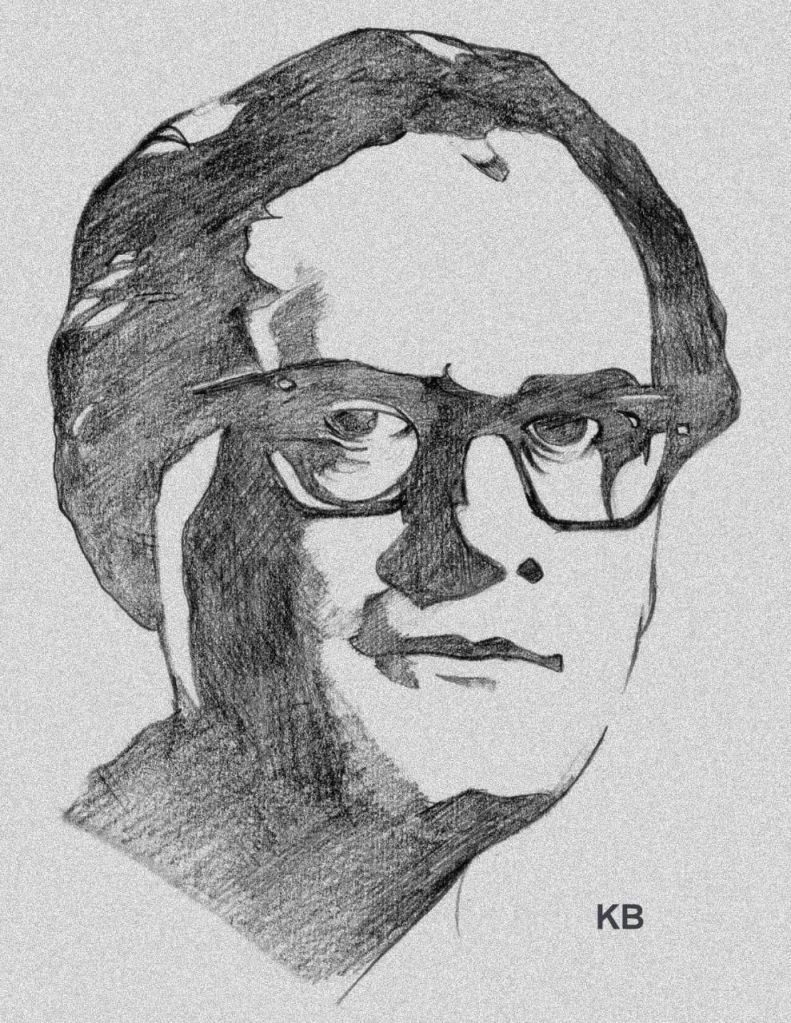
Of all the geniuses I’ve seen manifest themselves in my following Bollywood music, the man born a hundred and four years ago today at Vishwanath’s abode in his maternal grandfather’s home (a doctor himself) is pretty much right up there, atop the heap. He would have undoubtedly remained there for any one of his sublime skills, but the fact he had so many of them and so beautifully expressed as well, makes his position on my personal wall of fame even more certain. He was actually training to be an engineer, and in hindsight I shudder to think what would have happened if he hadn’t quit that vocation for focussing on the arts. He initially dabbled in literature but by the time he was getting out of his teens, zeroed in on music. ( Thank God!!!) . He initially started singing and composing in Bangla. Hemantada’s first film song was in the Bengali film Rajkumarer Nirbbasan when he was just out of his teens, the song was composed by S.D. Burman. This was followed by Nimai Sanyas the next year with music composed by Hariprasanna Das. Hemantada’s first compositions for himself were non-film songs like “Katha Kayonako Shudhu Shono” and “Amar Biraha Akashe Priya” .
.
His first Hindi film songs were in Meenakshi , followed by Irada both in the WWII era, with music composed by Amar Nath. Hemantada is rightfully considered the foremost exponent of Rabindra Sangeet. He has contributed more than anyone else in making Rabindrasangeet an inseparable part of the Bangla DNA and essential aspect of its ethos. In the mid-1940s, Hemantada became involved with the Indian People’s Theatre Association (IPTA) and this started a long collaboration with another active IPTA member — Salil Chowdhury. One of the main reasons behind the establishment of IPTA was the Bengal famine of 1943 and the cruel and callous inaction of the British administration to prevent the deaths, after all they had created it by taking away foodgrains from starving India to feed the British, a treacherous act supported by Mohandas Gandhi citing the lamest of excuses (That one act of collaboration and acquiescing to mass murder, nay a genocide larger in magnitude than the Holocaust stands out in showing his real colours and nature). In 1947, Hemantada recorded a non-film song called “Ganyer badhu” (“The rural bride”) that was written and composed by Salil Chowdhury. The six-minute song recorded on two sides of a 78 rpm disc was totally different from the conventional structure and romantic theme of a Bengali song.
It showed an idyllic, prosperous and caring rural woman’s life and family and how their world is destroyed by the demons of famine and ensuing stark poverty. This song touched a chord and gave voice to a throbbing pain and suffering of the people. It generated an unforeseen popularity for Hemantada and Salilda in eastern India and, in a way, established Hemantada way ahead of his male contemporaries.
.
His position in Bangla film music and Rabindrasangeet led him to be invited to Mumbai by Hemen Gupta , the revolutionary turned Netaji Subhas Chandra Bose’s secretary turned film writer/director. Hemenda had seen and appreciated Hemantada’s creativity and class from close quarters in Calcutta ( as it was then called). The two had worked together in multiple Bangla films. It was natural that he would invite Hemantada to Mumbai when he decided to make Anandamath based on Bankimchandra Chatterjee’s novel, which depicted the sannyasi uprising against the British in the 19th Century. The movie with its evocative and vigorous rendition of Vande Mataram got Hemantada national recognition. His breakthrough film was, however Nagin made 2 years later which enchanted and enthralled a nation and made the film the blockbuster and highest earner of the year but also got Hemantada the only Filmfare of his entire career. ( The fact that Hemantada and Salilda both got only one Filmfare in their entire career speaks of the way Filmfare awards were rigged. Both had multiple other films that deserved a Filmfare -and weren’t awarded. Add to that the fact that neither Jaidev nor Madan Mohan got any Filmfares and my argument is completely irrefutable).
.
I was hard-pressed to choose one song for today, I had more than a hundred to choose from. I zeroed in on one for a reason. Listen to this song. https://youtu.be/4ZlbYFEcJrg?si=8-OLsczORmATdp62
The movie is Kohraa , produced by Hemantada himself. His film production company as well as the home he stayed in were both called Gitanjali after Rabindranath Tagore’s immortal collection of poems. The unmistakable divine singing is by Latadidi and the lyrics are by Kaifi Azmi .
.
अहा हा हा …
अहा हा हा
.
ओ बेक़रार दिल
हो चुका है मुझको आँसूओं से प्यार
मुझे तू ख़ुशी न दे,
नई ज़िंदगी न दे
.
मिली चमन को बहार
हँसी फूल को मिली
गीत कोयल को मिले
और मैंने पाई ख़ामोशी
मुझे बाँसुरी न दे कोई रागिनी न दे
ओ बेक़रार दिल …
.
काली घटा घिर के घटा छाये
और प्यासी कली ग़म की जली तरस तरस जाये
.
रहे सदा जो मेरा
वही मेरी ज़िंदगी
है रोज़ अंधेरा
और चार दिन की चाँदनी
मुझे चाँदनी न दे मुझे रौशनी न दे
ओ बेक़रार दिल …
.
The movie Kohraa is an Indianized version of Rebecca by Daphne du Maurier with some spooky supernatural elements including a few from the movie Psycho This version is famous for the twist in its ending, which differs significantly from that of the original novel. The song’s composition was used by Hemantada in one of his Bangla movies Neele Akasher Neechey made by Mrinal Sen. Hemantada had produced the movie too. The movie won popular and critical acclaim and the song was rendered by Hemantada himself. It was included in Conrad Rooke’s Siddhartha. The lyrics for the Bangla song are by Gouriprasanna Majumdar. https://youtu.be/zwCAMVkfMJA?si=THTeUS9gLzeCzMH-
I’ve reproduced the Bangla lyrics in Roman script as reading in Bangla script is a challenge to me. My skills are painfully slow with that script.
.
O Nodire
.
O nodire
Ekti kotha shudhai shudhu tomaare
O nodire
Ekti kotha shudhai shudhu tomaare
Bolo kothay tomar desh
Tomar neiki cholaar shesh
O Nodire
.
Tomar kono bandhan naai
Tumi ghor chara ki taai
Tomar kono bandhan naai
Tumi ghor chara ki taai
Ei acho bhataay abar
Ei to dekhi jowaar e
.
O Nodire
.
Ekul bhenge okul tumi goro
Jaar ekul okul du kul gelo
Taar laagi ki koro
Ekul bhenge okul tumi goro
Jaar ekul okul du kul gelo
Taar laagi ki koro
.
Amay bhabcho michei por
Tomar naai ki oboshor
Amay bhabcho michei por
Tomar naai ki oboshor
Shukh dukkher kotha kichu
Koile na hoy amare
.
Bolo kothay tomar desh
Tomar neiki cholaar shesh
O Nodire
Ekti kotha shudhai shudhu tomaare
Bolo kothay tomar desh
Tomar neiki cholaar shesh
O Nodire
.
O Nodire
O Nodire
.
For those who would like to rather read it in the original form ( and for others who’d be happy to admire the script), here it is….
.
ও নদীরে,
একটি কথা শুধাই শুধু তোমারে
ও নদীরে,
.
একটি কথা শুধাই শুধু তোমারে
বলো কোথায় তোমার দেশ
তোমার নেই কি চলার শেষ
ও নদীরে…
.
তোমার কোনো বাঁধন নাই
তুমি ঘর ছাড়া কি তাই
তোমার কোনো বাঁধন নাই
তুমি ঘর ছাড়া কি তাই
এই আছো ভাটায়
আবার এই তো দেখি জোয়ারে
.
বলো কোথায় তোমার দেশ
তোমার নেই কি চলার শেষ
ও নদীরে…
.
এ কূল ভেঙে ও কূল তুমি গড়ো
যার একূল ওকূল দুকূল গেল
তার লাগি কি করো
এ কূল ভেঙে ও কূল তুমি গড়ো
যার একূল ওকূল দুকূল গেল
তার লাগি কি করো
.
আমায় ভাবছো মিছেই পর
তোমার নেই কি অবসর
আমায় ভাবছো মিছেই পর
তোমার নেই কি অবসর
সুখ দুঃখের কথা কিছু
কইলে না হয় আমারে …
বলো কোথায় তোমার দেশ
.
তোমার নেই কি চলার শেষ
ও নদীরে…
একটি কথা শুধাই শুধু তোমারে
বলো কোথায় তোমার দেশ
তোমার নেই কি চলার শেষ
ও নদীরে…
ও নদীরে…
.
I remember watching Hemantada perform live in the DD Mumbai studios, a tall simple figure, standing erect, clad in very simple clothes, a shawl draped around his broad shoulders, no airs at all, with just a harmonium in front and his unequalled, sublime baritone giving goosebumps to everyone in the small studio with just a pair of B/W cameras. Just a divine, out-of-body experience. Little wonder it was said of Hemantada , “If God had a singing voice, it would be like Hemantada”
.
Couldn’t agree more.
.
Can’t forget his beatific smile when he looked at me on the way out. After his vocal magic, everyone in the audience was standing with folded hands.
.
Truly the unassuming gentleman.
.
Stay happy Hemantada. I am sure you’re regaling everyone in heaven with your amazing voice. We were fortunate to have heard it for so long.

Leave a comment